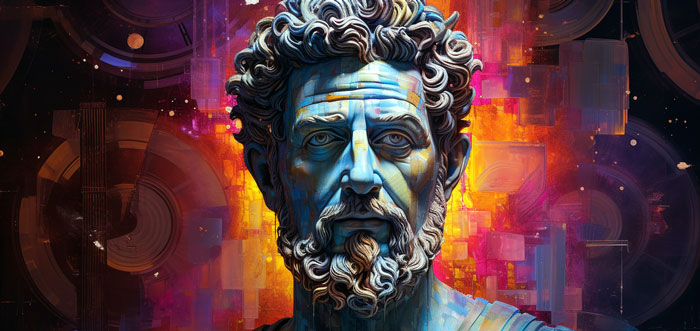
The End
…The Stoic,
taught by experience
and ruling himself by ideas!
He who otherwise only looks for uprightness, truth,
freedom from deceptions and shelter
from ensnaring and sudden attack,
in his misfortune performs the masterpiece of dissimilation;
he shows no twitching mobile face but as it were a mask
with dignified, harmonious features;
he does not cry out and does not even alter his voice;
when a heavy thundercloud burst upon him,
he wraps himself up in his cloak
and with slow and measured step
walks away from beneath it.
THE END
On Truth And Falsity In Their Extra-moral Sense by Friedrich Nietzsche, trans. by Oscar Levy
This passage concludes Early Greek Philosophy and Other Essays composed by Nietzsche and published posthumously in 1909. The last essay in the collection explores a distinctive feature of our species. As human I must fabricate a map of the reality exterior to my being. This model of reality is fashioned involuntarily, along with the acquisition of language. With language we learn how to recognize, and to voice the audible labels which our birth-society uses to label external objects, activities, etc.. A conventional interpretation of everything is adopted along with language.
Early in life the internal division begins. On one hand is the contribution of emotion, the sensations created by our nervous system, the five senses, upon contact with a context external to us. Think of the plethora of labels for sensations of pleasure, the entire spectrum extending all the way to revulsion.
Competing with this fundamental mapping of likes and dislikes, is reason. Reason fills our toolbox with abstractions. Number is an abstraction essential for measuring if you are to construct a house. Abstract concepts like freedom, democracy, justice are used to build institutions which offer refuge from the violent extremes of life. Reason is an important aspect of what we mean by civilization.
Nietzsche offers that two competing faculties within each of us, jointly fabricate viewpoints, ways-of-thinking that are solidarity fostering abstractions anchoring community, – our collective defense when the tide, or the wind, or the political weather turns.
Be assured, circumstances will turn. They always have.
As his final word Nietzsche writes, against the backdrop of homo sapiens’ jerry-built shelter, constructed out of hand-me-down, inadequate materials, — the old Stoics managed a lifestyle worth considering. I mean those shit-hits-the-fan, times of slow motion disintegration. The Stoic is not taken by surprise, has assessed that panic is unadvised. I agree with Nietzsche such is an audacious masterpiece of fabrication, this Stoic doubling-down upon reason. That is to see and understand the increase of institutional violence, the unraveling of the common good without flinching, without running for one’s bunker. The Stoic is prepared. Though as effected as are his fellows his mind is not disconnected by collapse of the status quo. He/she maintains control of him/herself by means of ideas.
The thunderstorm breaks, so he/she wrapped up in a cloak, with slow and measured step walks away.